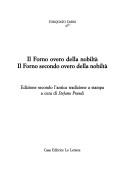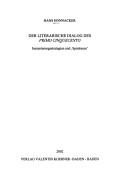| Listing 1 - 10 of 11 | << page >> |
Sort by
|
Book
Year: 1688 Publisher: London : Printed for R. Bentley, R. Chiswel, and T. Sawbridge,
Abstract | Keywords | Export | Availability | Bookmark
 Loading...
Loading...Choose an application
- Reference Manager
- EndNote
- RefWorks (Direct export to RefWorks)
eebo-0216

ISBN: 8871664493 Year: 1999 Publisher: Firenze Le lettere
Abstract | Keywords | Export | Availability | Bookmark
 Loading...
Loading...Choose an application
- Reference Manager
- EndNote
- RefWorks (Direct export to RefWorks)
Book
Year: 1813 Publisher: Parma: dalla stamperia Carmignani,
Abstract | Keywords | Export | Availability | Bookmark
 Loading...
Loading...Choose an application
- Reference Manager
- EndNote
- RefWorks (Direct export to RefWorks)
Book
Year: 1673 Publisher: London : Printed by T.R. for J. Martyn,
Abstract | Keywords | Export | Availability | Bookmark
 Loading...
Loading...Choose an application
- Reference Manager
- EndNote
- RefWorks (Direct export to RefWorks)
eebo-0113
Book
Year: 1689 Publisher: London : Printed for R. Chiswell, T. Sawbridge, and R. Bentley,
Abstract | Keywords | Export | Availability | Bookmark
 Loading...
Loading...Choose an application
- Reference Manager
- EndNote
- RefWorks (Direct export to RefWorks)
eebo-0167
Book
Year: 1673 Publisher: London : Printed by T.R. for J. Martyn ...,
Abstract | Keywords | Export | Availability | Bookmark
 Loading...
Loading...Choose an application
- Reference Manager
- EndNote
- RefWorks (Direct export to RefWorks)
eebo-0014

ISBN: 3873204401 Year: 2002 Volume: 40 Publisher: Baden-Baden Koerner
Abstract | Keywords | Export | Availability | Bookmark
 Loading...
Loading...Choose an application
- Reference Manager
- EndNote
- RefWorks (Direct export to RefWorks)
Book
Year: 1657 Publisher: London : Printed for J. Martin, and J. Allestrye ...,
Abstract | Keywords | Export | Availability | Bookmark
 Loading...
Loading...Choose an application
- Reference Manager
- EndNote
- RefWorks (Direct export to RefWorks)
eebo-0098
Dialogues, Italian --- Italian language --- Study and teaching
Multi
ISBN: 0521405386 0521069661 0511895712 9780511895715 9780521405386 9780521069663 Year: 1992 Volume: vol 2 Publisher: Cambridge Cambridge University Press
Abstract | Keywords | Export | Availability | Bookmark
 Loading...
Loading...Choose an application
- Reference Manager
- EndNote
- RefWorks (Direct export to RefWorks)
This is a full-length study of the use of the dialogue form in Italy from the early sixteenth century until Galileo. Drawing on a wide range of sources, it examines the characteristics which determined the genre's unrivalled popularity in the period as a vehicle for polemic, debate, technical exposition and comic drama. More than simply an account of the development of an individual literary genre, however, the book is a contribution to the broader social and cultural history of the period. As representations of conversation, miniature dramas of persuasion, the dialogues of the Italian Renaissance constitute an extraordinarily rich - and largely untapped - source of information about the ideals and practice of communication in the early modern age.
Italian literature --- History of civilization --- Sociolinguistics --- anno 1500-1799 --- Italy --- Dialogues, Italian --- Renaissance --- History and criticism. --- Dialogues [Italian ] --- History and criticism --- 16th century --- 17th century --- Civilization --- 1268-1559 --- 1559-1789 --- Dialogues, Italian - History and criticism. --- Italian literature - 16th century - History and criticism. --- Italian literature - 17th century - History and criticism. --- Reniassance - Italy. --- Italy - Civilization - 1268-1559. --- Italy - Civilization - 1559-1789. --- Arts and Humanities --- Literature --- Italian dialogues
Book
ISBN: 9789004342521 9789004343719 9004343717 9004342524 Year: 2017 Volume: 18 Publisher: Leiden Brill
Abstract | Keywords | Export | Availability | Bookmark
 Loading...
Loading...Choose an application
- Reference Manager
- EndNote
- RefWorks (Direct export to RefWorks)
Re-evaluating the dialogue’s place in the literary landscape of the Italian and French Renaissance, Speaking of Love presents the love dialogue at the intersection of a revival of the form and the period’s philosophies of love and desire. Between 1540 and 1580, authors such as Speroni, Tullia d’Aragona, the Venetian poligrafi, Tyard, Le Caron, Pasquier, Taillemont, Marguerite de Navarre, and Louise Labé, feature interlocutors not only deliberating on love but imitating the experience of love in their dynamics of speaking. These love dialogues allow early modern ideologies and discourses of love to be imitated by the reader and rival lyric poetry in conveying amorous experience, validating dialogue as an authentic literary form rather than a tool of philosophical thinking.
Comparative literature --- Italian literature --- Thematology --- French literature --- anno 1400-1499 --- anno 1500-1599 --- Dialogues [Italian ] --- History and criticism --- Dialogues [French] --- 16th century --- 17th century --- Love in literature --- Dialogues, Italian --- Dialogues, French --- Love in literature. --- Renaissance --- French dialogues --- Italian dialogues --- History and criticism.
| Listing 1 - 10 of 11 | << page >> |
Sort by
|

 Search
Search Feedback
Feedback About UniCat
About UniCat  Help
Help News
News